
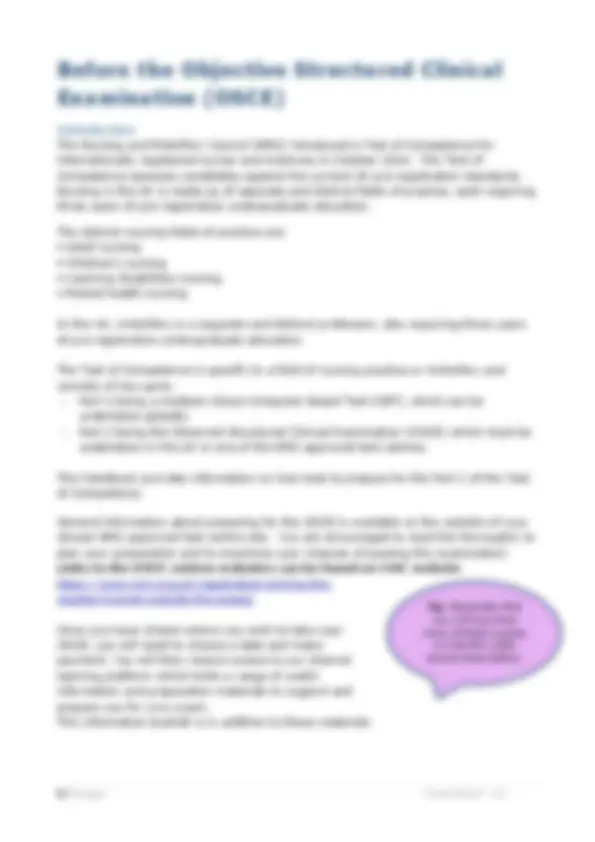
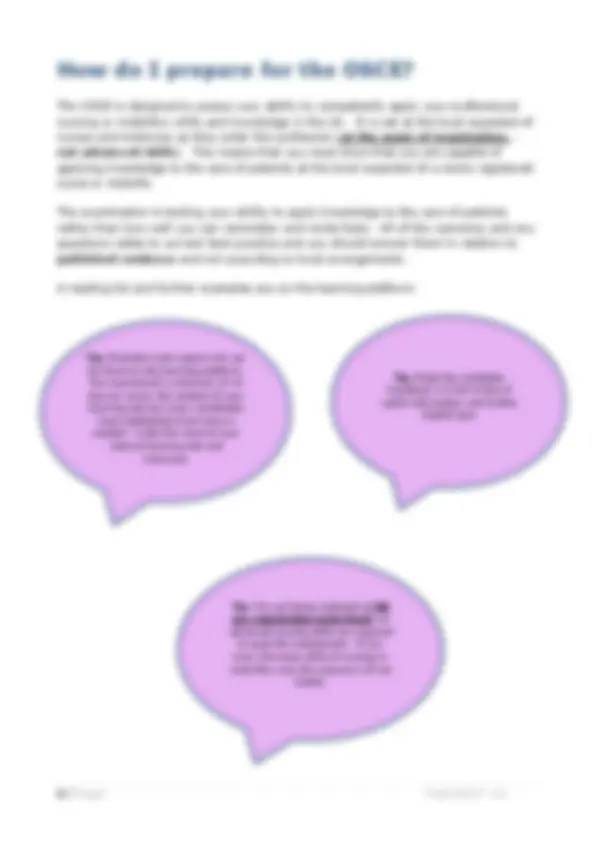
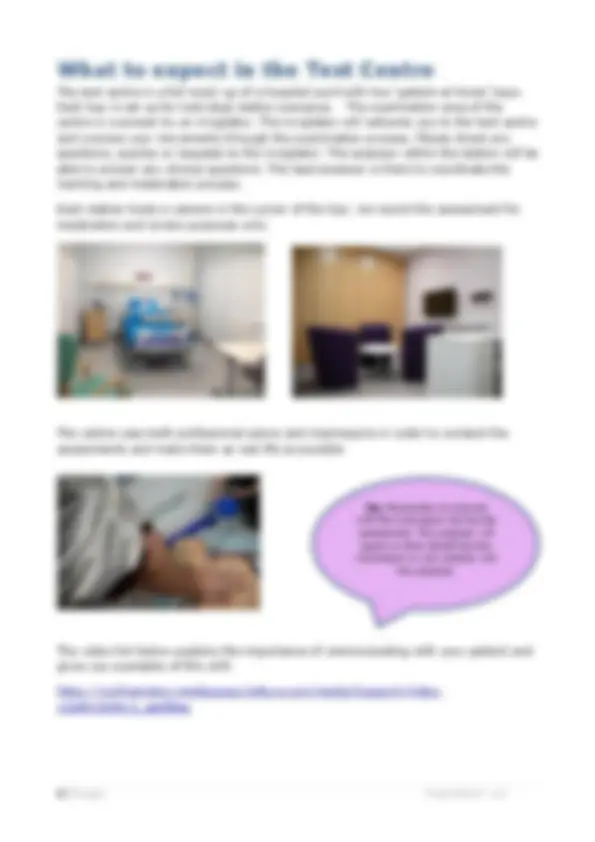
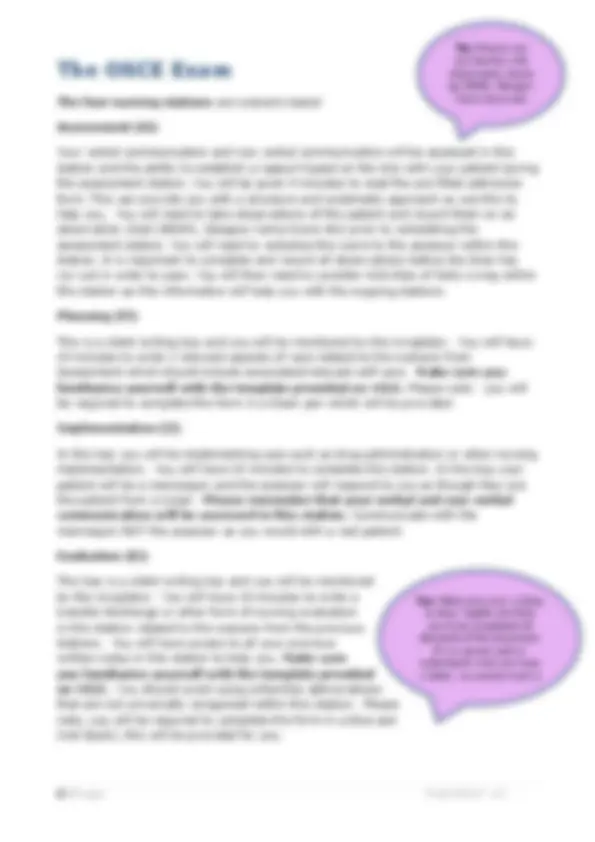
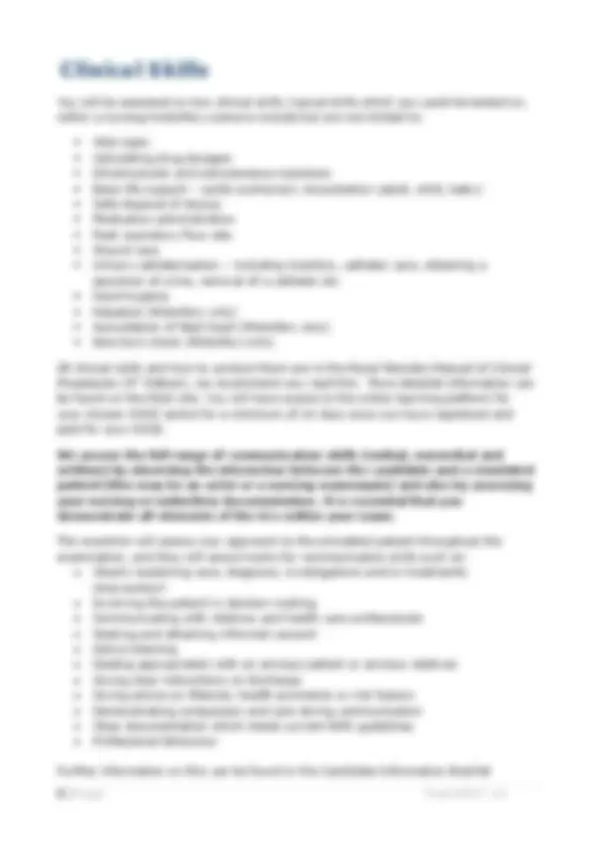
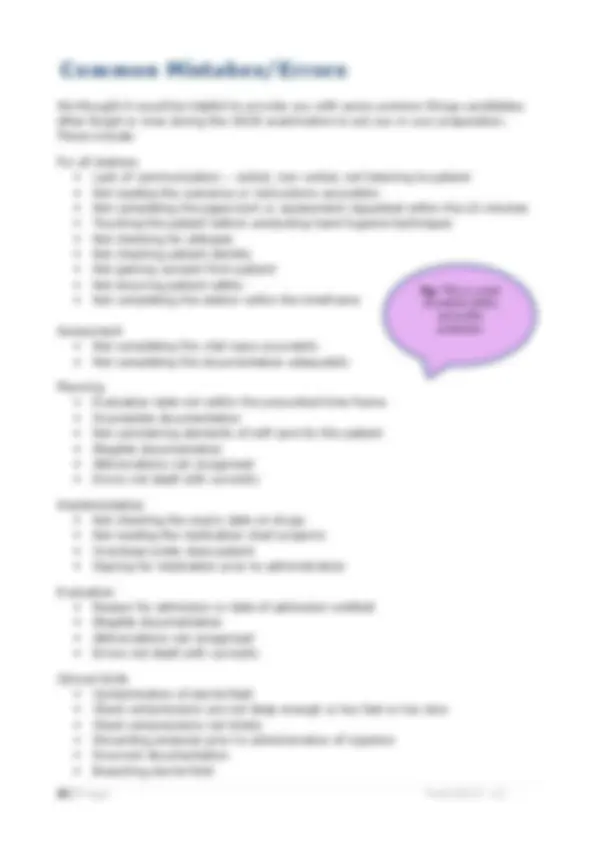
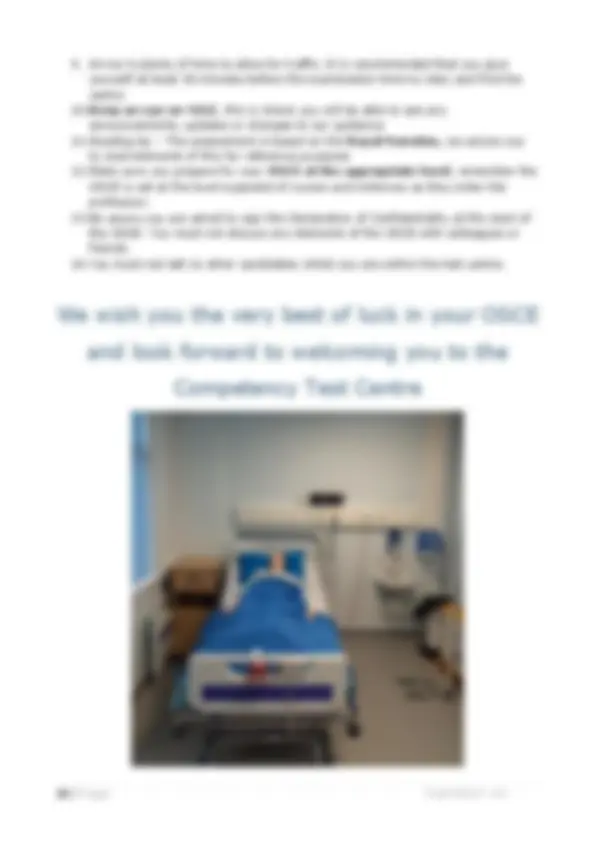


Study with the several resources on Docsity

Earn points by helping other students or get them with a premium plan


Prepare for your exams
Study with the several resources on Docsity

Earn points to download
Earn points by helping other students or get them with a premium plan
Community
Ask the community for help and clear up your study doubts
Discover the best universities in your country according to Docsity users
Free resources
Download our free guides on studying techniques, anxiety management strategies, and thesis advice from Docsity tutors
The OSCE is designed to assess your ability to competently apply your professional nursing or midwifery skills and knowledge in the UK. It is set at the level ...
Typology: Lecture notes
1 / 13

This page cannot be seen from the preview
Don't miss anything!








This booklet has been produced to support candidates preparing for Part 2 of the Test of Competence. This information compliments the Candidate Information Booklet and NILE material and will be updated regularly to ensure candidates receive the most current information. The most recent version can be found on our website at: http://www.northampton.ac.uk/about-us/services-and-facilities/nmc-test-of- competence/
Tip: Example exam paperwork can be found on the learning platform. We recommend a minimum of 14 days to review the content of your learning site but many candidates have highlighted more time is needed - make the most of your internal learning site and resources. Tip: You are being assessed at UK pre-registration entry level; no advanced nursing skills are required to pass this assessment. If you know the basic skills of nursing or midwifery care the scenario will not matter. Tip: Read the candidate handbook it is full of lots of useful information and further helpful tips!
The OSCE is designed to assess your ability to competently apply your professional nursing or midwifery skills and knowledge in the UK. It is set at the level expected of nurses and midwives as they enter the profession ( at the point of registration, - not advanced skills ). This means that you must show that you are capable of applying knowledge to the care of patients at the level expected of a newly registered nurse or midwife. The examination is testing your ability to apply knowledge to the care of patients rather than how well you can remember and recite facts. All of the scenarios and any questions relate to current best practice and you should answer them in relation to published evidence and not according to local arrangements. A reading list and further examples are on the learning platform.
The test centre is a full mock-up of a hospital ward with two ‘patient at home’ bays. Each bay is set up for individual station scenarios. The examination area of the centre is overseen by an invigilator. The invigilator will welcome you to the test centre and oversee your movements through the examination process. Please direct any questions, queries or requests to the invigilator. The assessor within the station will be able to answer any clinical questions. The lead assessor is there to coordinate the marking and moderation process. Each station hosts a camera in the corner of the bay; we record the assessment for moderation and review purposes only. The centre uses both professional actors and mannequins in order to conduct the assessments and make them as real life as possible The video link below explains the importance of communicating with your patient and gives you examples of this skill: https://northampton.mediaspace.kaltura.com/media/Support+Video- +Soft+Skills/1_adcf8tqr Tip: Remember to interact with the mannequin during the assessment. The assessor will speak on their behalf but the mannequin is your patient, not the assessor
Tip: If you make a mistake do not panic, make sure you tell the assessor within the assessment time, share what you would do to correct it and this will be taken into account. However verbalisation will not overturn a critical fail.
The OSCE is made up of six stations, each lasting between 10 – 20 minutes. The OSCE is a scenario based approach which includes the following A - Patient Centred Assessment P - Planning Care I - Implementation E - Evaluation There are also two skill stations which you will be tested on. The skills are based on the list provided in the Candidate Information Booklet. (also see page 9 in this document) In each station you will be given information about what is expected of you and patient information for you to follow. Please read this information and ensure you understand what is expected of you within the station. Focus on the task and follow the requirements set out on the information sheet. There are timers on the wall so you can keep track of your time. Within this time, you must demonstrate safe practice and competencies within each station. Any activity outside of the allocated time will not be assessed, so please ensure you do everything within the time frame. You will be given prompts as to how much time you have left to help you manage your time within the station. During each of the stations you need to verbalise what you are doing to the assessor. We introduce new scenarios and skills regularly so there is no guarantee you will sit the same scenario as a colleague or friend. We plan the examination to ensure candidates receive a variety of different scenarios and skills.
Tip: Ensure you are familiar with observation charts eg NEWS, Glasgow Coma Score etc Tip: Make sure your writing is clear, legible and that you have completed all elements of the document. If we cannot read or understand what you have written, we cannot mark it
The four nursing stations are scenario based Assessment (A): Your verbal communication and non-verbal communication will be assessed in this station and the ability to establish a rapport based on the 6Cs with your patient during the assessment station. You will be given 5 minutes to read the pre-filled admission form. This can provide you with a structure and systematic approach so use this to help you. You will need to take observations of the patient and record them on an observation chart (NEWS, Glasgow Coma Score etc) prior to completing the assessment station. You will need to verbalise this score to the assessor within this station. It is important to complete and record all observations before the time has run out in order to pass. You will then need to consider Activities of Daily Living within this station as this information will help you with the ongoing stations. Planning (P): This is a silent writing bay and you will be monitored by the invigilator. You will have 15 minutes to write 2 relevant aspects of care related to the scenario from Assessment which should include associated/relevant self-care. Make sure you familiarise yourself with the template provided on NILE. Please note - you will be required to complete this form in a black pen which will be provided. Implementation (I): In this bay you will be implementing care such as drug administration or other nursing implementation. You will have 15 minutes to complete this station. In this bay your patient will be a mannequin and the assessor will respond to you as though they are the patient from a script. Please remember that your verbal and non-verbal communication will be assessed in this station. Communicate with the mannequin NOT the assessor as you would with a real patient. Evaluation (E): This bay is a silent writing bay and you will be monitored by the invigilator. You will have 15 minutes to write a transfer/discharge or other form of nursing evaluation in this station related to the scenario from the previous stations. You will have access to all your previous written notes in this station to help you. Make sure you familiarise yourself with the template provided on NILE. You should avoid using unfamiliar abbreviations that are not universally recognised within this station. Please note, you will be required to complete this form in a blue pen (not black), this will be provided for you.
Tip: This is a test of patient safety and public protection
We thought it would be helpful to provide you with some common things candidates often forget or miss during the OSCE examination to aid you in your preparation. These include: For all stations Lack of communication – verbal, non-verbal, not listening to patient Not reading the scenarios or instructions accurately. Not completing the paperwork or assessment requested within the 15 minutes Touching the patient before conducting hand hygiene techniques Not checking for allergies Not checking patient identity Not gaining consent from patient Not ensuring patient safety Not completing the station within the timeframe Assessment Not completing the vital signs accurately Not completing the documentation adequately Planning Evaluation date not within the prescribed time frame Incomplete documentation Not considering elements of self-care for the patient Illegible documentation Abbreviations not recognised Errors not dealt with correctly Implementation Not checking the expiry date on drugs Not reading the medication chart properly Overdose/under dose patient Signing for medication prior to administration Evaluation Reason for admission or date of admission omitted Illegible documentation Abbreviations not recognised Errors not dealt with correctly Clinical Skills Contamination of sterile field Chest compressions are not deep enough or too fast or too slow Chest compressions not timely Discarding ampoule prior to administration of injection Incorrect documentation Breaching sterile field
The university has robust quality assurance processes, which we must adhere to. These are also independently verified and validated by the QAA and NMC to deliver the Test of Competence Part 2. When you enter a work station there will be an area for the assessor to mark you during your assessment. You will be marked only on your competences demonstrated during the assessment. All our assessors are fully qualified nurses or midwives with full sign off mentorship registration and undergo full training prior to joining the assessor team for the OSCE. Each OSCE station has a unique 20 criterion based assessment sheet which is matched to the scenario or skill being assessed, examiners will score each criteria. The 20 criterion is mapped against the NMC standards for Pre-Registration Education 2010 and the NMC Code 2015. The skills assessments are also mapped against the above but also mapped against the Royal Marsden Manual of Clinical Procedure s (9th^ Edition). An e-book is available on NILE. Your entire exam will be digitally recorded and assessed in live time and you will be marked as either a pass or a fail. Once your full assessment has been completed, documents and videos are moderated by an independent examiner and confirmed by the Lead Assessor or Test Centre Manager before a final decision is made.
All results will be emailed by the NMC to your personal email address (as registered with the NMC) within 5 working days of your examination. Pass = Candidates who pass all six scenarios and skills stations at the first attempt Partial Fail (APIE) = Candidates fail a single scenario but pass ALL skills stations (Fail and will require a partial Re-sit at 50% cost ) Therefore you will need to sit all APIE stations at your resit. You will be required to sit an entirely new scenario, not just the specific station(s) you have failed. Partial Fail (Skills) = Candidates pass all scenario stations but fail one or more skills station (Fail and will require a partial Re-sit at 50% cost ) Therefore you will need to sit 2 skills at your resit. You will be required to sit the station you failed to show competence in, plus another from the list of skills in your handbook. Full Fail (1st^ attempt) = Candidates who fail more than one scenario or skills station (Fail and will require full Re-sit at full cost ) Therefore you will need to sit all APIE & 2 skills stations at your resit.